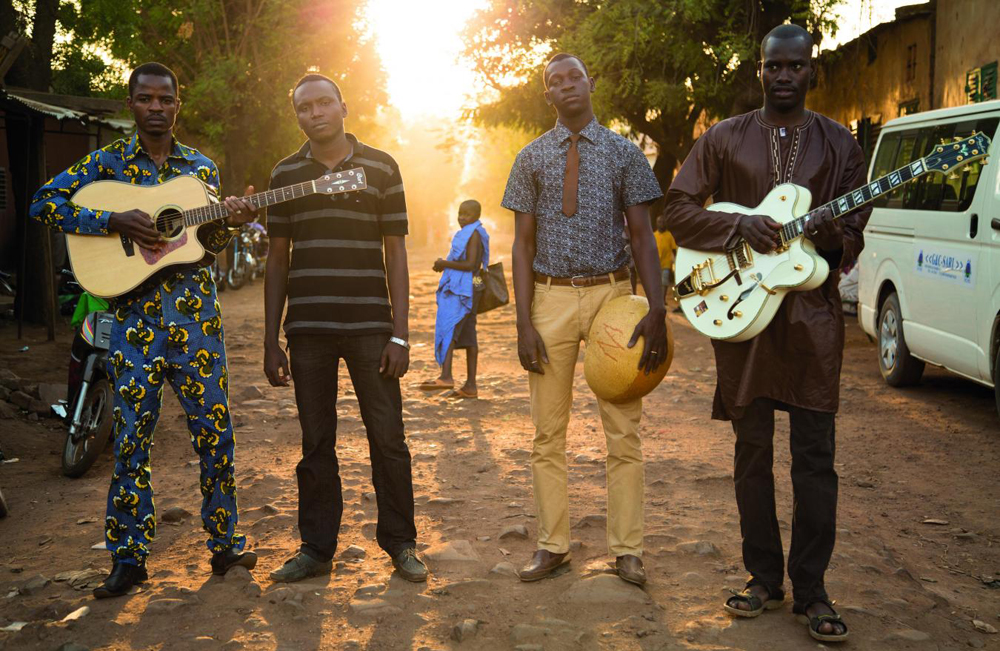It was around the time that Johanna Schwartz five months pregnant that she decided to give birth to something else that would require a lot of care and attention. She already had one child, so by comparison, making her first feature “They Will Have to Kill Us First” was far more unpredictable.
“We had no idea where the story was going to go, I had no idea about how many years I’d be filming. I had no idea what the ending was going to be. but it all worked itself out,” said Schwartz. “I think that what we ended with is a remarkable story which is harrowing yes, but inspirational, and there are layers there that can be unraveled for years to come.”
The British-based filmmaker had already spent over a decade covering Africa for BBC World, but had long wanted to tell a story about the continent that was different than what she typically saw in the media at large. In late 2012, she found an opportunity when Islamic extremists in Mali put in place sharia law, including a ban on music – performing or even listening to it – that led many to flee Timbuktu for areas they could play freely. The timing wasn’t ideal, given her growing belly, but Schwartz couldn’t shake the idea of musicians being silenced in, as she says, “the birthplace of the blues, a place where music is a prime form of communication,” so she wasted no time in putting a crew together to tell the story of four musical acts – Khaira Arby and Fadimata “Disco” Walett Oumar, Moussa Ag Sidi and the band Songhoy Blues – who respond to the ban in their own ways, whether it’s by decamping for Bamako, Burkina Faso and beyond to continue to pursue the music or finding more covert ways to revolt.
Not only does “They Will Have to Kill Us First” captures a political rebellion as it unfolds, but it’s underscored by the vibrant and lively music of Malian artists past and present that demonstrate both what would be lost if such a ban continued to be enforced and the power of song as a means of communication in the nation. As the film rolls into America following a successful premiere last year at SXSW, Schwartz spoke about how she hit the ground running to make the film, picking out a soundtrack that would help her tell the story, and what it was like to make her first feature.

We were looking for people that were deeply involved in the situation in Mali and different people with different experiences, so a natural story kind of rose to the top and my co-writer, Andy Norton, said it was like a photograph coming into focus. I definitely wanted the story to be told by Mali musicians who were affected by the conflict and we met with so many, but we wanted either musicians from the North who had to flee or in the case of Disco, not only did she have to flee the north, but her husband was part of the rebel army who rose up against the government and kickstarted this whole conflict. Every time we went [to Mali], it was a little bit clearer how the story needed to tell itself.
You’ve said you actually met Khaira through a fixer. Was it difficult to get access into this world?
It actually was a lot easier than I thought it was going to be. I had filmed out of Africa, but never in Mali and I don’t have a lot of French-language skills. But on the first very morning that we were in Mali, a fixer who I had just met took us to his mother’s best friend’s house, and his mother’s best friend was Khaira Arby, and I was a massive fan. I knew her music very well. She’s the mother of music in Mali, the only singer who sings in all seven languages of the country, so she’s very, very special. That was the first morning that we were there, and it was meant to be a research trip, not filmed, but that meeting made it into the final film and it’s really the backbone of her interview in the film. At that moment, I had an inkling I’m going to be able to tell this story and it just went from there, evolving unfolding in front of us and our only job was to keep up with it.

No, it was absolutely fine. Oddly enough, I was the only journalist there who had a massive crew, including a baby with me, so that made me stand out in a good way. People were like, “Who is that?” There were other journalists because the conflict in Mali was a big story at that time in Europe, especially in France, Mali’s former colonial ruler. But somehow I found a story that nobody else was, and then for all the musicians that we filmed with over the years, they saw me pregnant and they met the baby after the baby was born, so they felt ownership over my baby, which I love, and they trusted me and I trusted them. It was a beautiful way to tell this story.
There’s an amazing moments in the film where the Songhoy Blues are working on a song as the sun sets behind them. You couldn’t have possibly staged it, but it’s so perfectly synchronized it seems like you did. How did that beautiful moment happen?
It was a beautiful moment and I myself wasn’t there! I had flown home to the UK the day before. But we were working with a wonderful American camerawoman living in Mali at the time, Tanya Bindra, who was working as a stringer and a photojournalist for a lot of major news organizations. We had a couple more days on the clock with her and as I was leaving Mali, I just said, “Look, hang out with Songhoy Blues. Just go with them and film them what they do,” so she went with them to the river and filmed that moment where they wrote the song “Baba Hou,” which is a beautiful song, which appears on our soundtrack and it was just one of those magical moments.
When you are making these documentary films, you have to be like the breeze and go wherever the wind takes you. That’s where you find the magic. So that’s what we tried to do every single day of filming and in Africa especially, [visually] it’s so vibrant. Everything is right there, you just have to capture it. It’s all there, it’s a gift, so it was such a joy to capture the vibrancy of the colors and the chaos in the city but the calmness of the desert and all these extremes you get there. It provided such an incredible backdrop to the story. Tanya is so talented and our [main cinematographer] Karelle Walker is a truly gifted, gifted camerawoman. We never told a musician where to sit or what to dress or what to say. We just let things happen, and that’s what makes the documentary so powerful. You can’t write this stuff. Real life is just so much more extraordinary sometimes than fiction.

We actually commissioned the majority of the soundtrack ourselves, so a lot of the musicians weren’t characters in the film, but we either knew them before or became friendly with during the course of the filming and we asked them to write songs that would help us tell the story. That wonderful rap by Amkoullel at the beginning of the film where he lays out the backstory to what had happened in Mali prior to music being banned, we could never have told [the story in the rest] of the film without having that background at the beginning. We would’ve had to spend 20 minutes explaining what had happened, but when you do it in a rap by Amkoullel, you can bring everyone up to the point where they need to be very quickly, so he wrote that for us, [set] to music that was composed by Nick Zinner from the Yeah Yeah Yeahs, who was the composer of our film’s soundtrack.
We worked with some really cool Malian artists on the movie and I think the soundtrack is a completely other layer to the story. After they see the film, for people who want to learn a bit more about what’s happening, I think the soundtrack is a really great next step to understand the story and the situation of the Mali artists.
Has it been really gratifying to you to help spread of this music around the world?
It is the most extraordinary professional filming experience I’ve ever had, a massive privilege from start to finish, and there’s nothing that I like more than sharing the music and the story with the world. I just want the world to meet these incredible people and know their story, and understand the complexity because it’s not just black and white. Not everybody in this film is a hero, which is very much part of the story. This is real life and there’s are some bad things that happen in this film and there are people who make some bad decisions about their own lives and what they are going to do, and who they are going to support. This is all part of what happened and I just hope that people will take the time to watch the film and be moved by it.

Yeah, absolutely. Everything that I had made up until now, really was a commission for somebody else in television, or commercials in the past or branded content. This was the first time that I ever struck out on my own and told a story that I wanted to tell in my own time, in my own way and it was an experience I think that I would love to repeat. I’m used to making things that were a lot shorter, but It was hugely satisfying to make something that had a little bit more meat on it. I’m so proud that I was able to be there and the many musicians let me tell their story. It’s not my story. It’s theirs.
“They Will Have to Kill Us First” is open in New York at the Village East and will open in Los Angeles on April 1st, followed by more cities in the weeks after. A schedule can be found here.




